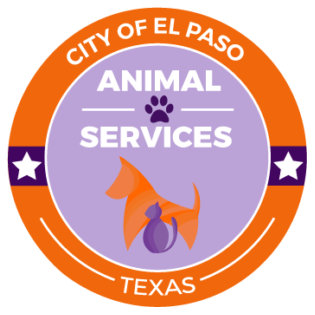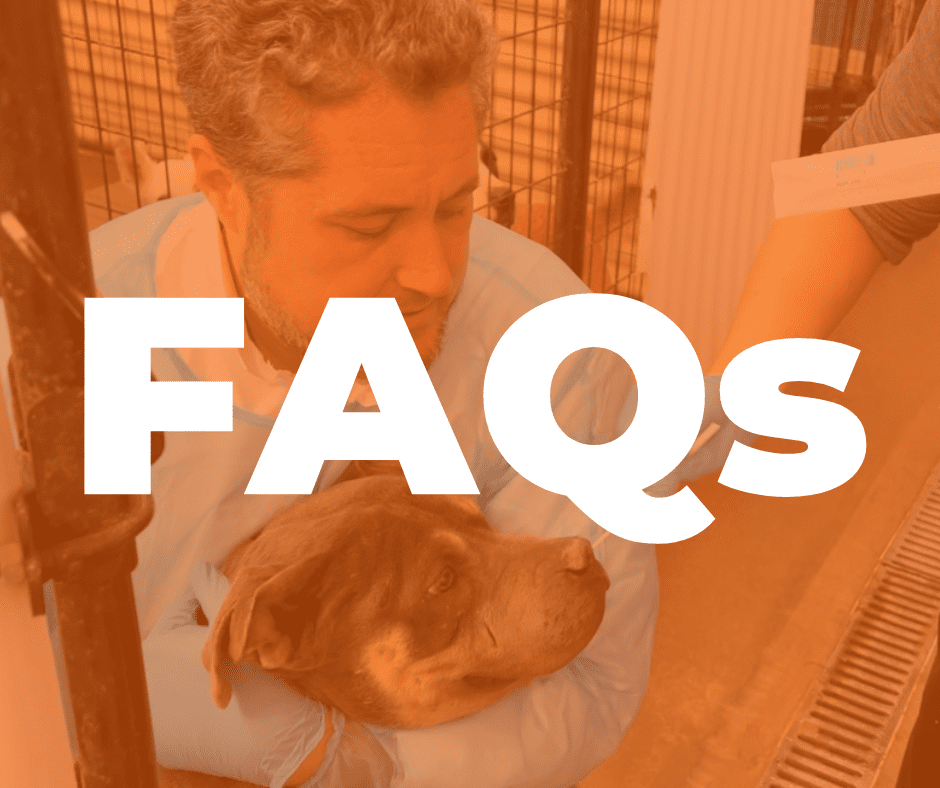*The Distemper and Strep Zoo Outbreak was contained in the shelter as of March 2023. For further information, please visit our News page.*
THIS IS A LIVING LIST OF FREQUENTLY ASKED QUESTIONS REGARDING OUR RESPONSE TO THE CURRENT UPPER RESPIRATORY OUTBREAK
To read the full press release regarding this current situation, click here.
WHAT IS CANINE DISTEMPER?
Similar to human viruses such as COVID-19, Canine Distemper is a highly contagious and potentially lethal virus, which causes severe illness, attacking multiple body systems, resulting in a widespread infection that is difficult to treat. Canine distemper is spread through direct contact or airborne exposure. Distemper is a risk to all dogs, but unvaccinated dogs and puppies under four months old, or immunocompromised dogs, are particularly susceptible to canine distemper.
WHAT ARE THE SIGNS AND SYMPTOMS FOR CANINE DISTEMPER?
Signs of infection include clear or green nasal and eye discharge, lethargy, coughing, vomiting, diarrhea, difficulty breathing, and in advanced stages, muscle twitching and seizures.
IS THERE A VACCINE FOR DISTEMPER?
There is a vaccination for Canine Distemper. Dogs should receive a series of 3 to 4 vaccines during puppyhood, then a yearly booster throughout their life to protect them from this disease.
Canine Distemper is ENTIRELY PREVENTABLE by ensuring your pet is fully vaccinated and up-to-date on their vaccines.
IS THERE A TREATMENT FOR DISTEMPER?
There is no specific treatment for distemper and no specific drug is available that will kill the virus in infected dogs. Treatment consists primarily of efforts to prevent secondary infections; control vomiting, diarrhea, or neurologic symptoms; and combat dehydration through administration of fluids. Ill dogs should be separated from other dogs.
WHERE DOES DISTEMPER COME FROM?
Canine distemper is a highly contagious and serious disease caused by a virus that attacks the respiratory, gastrointestinal, and, often, the nervous systems of puppies and dogs. The virus also infects and can be transmitted through wildlife. The virus can be spread through airborne exposure to the virus contained in respiratory secretions, as well as other bodily fluids such as vomit, feces and urine. Distemper is very much prevalent in the borderland region, which is why it’s important that all pets are vaccinated and up-to-date on vaccinations.
WHAT IS STREP ZOO?
Strep zoo is a bacterium normally found in horses, cattle, and pigs that rarely causes disease. But when this bacterium infects immunocompromised dogs, it may cause severe pneumonia. There is no vaccine for strep zoo and few warning signs. The bacterium has caused outbreaks of fatal pneumonia in shelter dogs worldwide due to the stressed and crowded conditions in the shelter. Signs of infection include fever, depression, vomiting, labored breathing, coughing blood, and discharge from the nose. The onset is typically sudden.
WHAT ARE THE SIGNS AND SYMPTOMS FOR STREP ZOO?
Signs of infection include fever, depression, vomiting, labored breathing, coughing blood, and discharge from the nose. The onset is typically sudden.
IS THERE A VACCINE FOR STREP ZOO?
There is no vaccine for strep zoo and few warning signs. The bacterium has caused outbreaks of fatal pneumonia in shelter dogs worldwide due to the stressed and crowded conditions in the shelter.
IS THERE A TREATMENT FOR STREP ZOO?
Strep Zoo is typically treatable with antibiotics.
WHERE DOES STREP ZOO COME FROM?
Strep Zoo is a bacterium that, when found in dogs, it is usually in kennel settings due to the stressed and crowded conditions in the shelter.
WHAT SHOULD I DO IF MY PET IS DISPLAYING SIGNS AND SYMPTOMS?
If your pet is showing signs and symptoms of either of these illnesses, contact your personal veterinarian immediately. It is also important to keep them separated from other dogs while the pet is undergoing treatment.
I JUST ADOPTED A DOG FROM EPAS, WHAT SHOULD I LOOK OUT FOR?
It has always been, and will continue to be, strongly encouraged to keep newly added pets away from owned pets for the first couple of weeks, and establish a relationship with your personal veterinarian. If your pet is NOT displaying any signs or symptoms, don’t panic and continue to monitor your pet’s health and consult with your veterinarian. If you have adopted a dog after February 20, 2023, you can also contact us at EPASadoptions@elpasotexas.gov and we can provide you with additional information and support.
I JUST FOSTERED A DOG FROM EPAS, WHAT SHOULD I LOOK OUT FOR?
If the pet is NOT displaying any signs or symptoms, just continue to monitor the pet’s health. If your foster pet is displaying any symptoms, contact the foster team at EPASfoster@elpasotexas.gov so we can schedule you for a foster vet check.
Healthy foster returns are being suspended until further notice.
SHOULD I BE WORRIED ABOUT MY CATS AT HOME?
Canine distemper cannot be transmitted to cats or other pocket pets, and Strep Zoo rarely infects cats (ie. In cases of a cat with very poorly functioning immune systems).
WHAT ARE EMERGENCY ADMISSIONS?
El Paso Animal Services is shifting to Emergency Operations and will only accept emergency intakes at the shelter until further notice. The community is asked to call 311 to report an animal that is sick, injured, aggressive, or in danger, in which a case will be generated and relayed to Animal Protection Officers to be addressed appropriately.
If the community finds a lost pet, they are encouraged to help reunite the pet with its owners. Chances are lost pets haven’t wandered too far from home and are much more likely to be reunited with their families if they stay within their communities. Animal Services is providing anyone that finds a lost pet with supplies and support to help finders reunite pets with their owners, including Distemper/Parvo vaccinations. For more information on how to help reunite a lost pet, visit www.ElPasoAnimalServices.org/FoundPetResources.
HOW CAN I PROTECT MY OWNED PETS AT HOME?
Again, Distemper is VERY prevalent in our community, but is very much preventable. Make sure your dogs at home are vaccinated for Distemper (as well as Parvo and Rabies), and have received yearly boosters. If your pet is missing that vaccine or is not up-to-date on their vaccines, we are urging pet parents to get that done as soon as possible.
Another way to protect your pets is to make sure your home is safe and secure. Make sure your pet stays properly confined to your home, that any doors and gates are locked and ensure your pet is not able to escape. If your pet goes missing, they could be exposed to illness in the environment outside, or brought to the shelter, which also puts them at risk. For the chance that your pet might get lost, make sure your pet is microchipped and that your contact information is up to date—also make sure they are wearing a collar and tags! This will help them get back home to you, without the need of being brought to the shelter.
WHAT ARE EMERGENCY ADMISSIONS?
El Paso Animal Services is shifting to Emergency Operations and will only accept emergency intakes at the shelter until further notice. The community is asked to call 311 to report an animal that is sick, injured, aggressive, or in danger, in which a case will be generated and relayed to Animal Protection Officers to be addressed appropriately.
If the community finds a lost pet, they are encouraged to help reunite the pet with its owners. Chances are lost pets haven’t wandered too far from home and are much more likely to be reunited with their families if they stay within their communities. Animal Services is providing anyone that finds a lost pet with supplies and support to help finders reunite pets with their owners, including Distemper/Parvo vaccinations. For more information on how to help reunite a lost pet, visit www.ElPasoAnimalServices.org/FoundPetResources.
We are asking the community to help reunite lost pets rather than bringing them to the shelter in order to protect the health and wellness for all pets in our community.
HOW CAN I HELP?
FOSTERING: As we move through our testing phases at the shelter, we will be identifying low/no risk dogs that we will need to send into foster homes to reduce their chances of exposure. If you are able to take a low/no risk dog as a foster, please email us at EPASfoster@elpasotexas.gov.
We will also need fosters for distemper-positive or exposed dogs. This would be an opportunity for homes with no other dogs or with fully-vaccinated dogs who have healthy immune systems. Our foster team will provide you with information and training on how to foster a distemper dog. If you are able to take a distemper dog as a foster, please email us at EPASfoster@elpasotexas.gov with the subject line ‘Distemper Foster’
DONATING: With pets at the shelter being confined to their animal housing areas more, we are going to need more enrichment for them! We are in need of donations such as: benebones, frisbees, kongs, spray cheese, toys and treats.
HELP LOST PETS GET BACK HOME: If you find and pick up a lost pet, help them find their way home rather than bringing them to the shelter. El Paso Animal Services is closed to non-emergency intake until further notice to reduce the risks of spreading or bringing in illness—this is not only important for the animals currently in the shelter, but also the animals in the public that could find themselves coming into the shelter, and reduce everyone’s risk of exposure.



Leave a Reply
You must be logged in to post a comment.